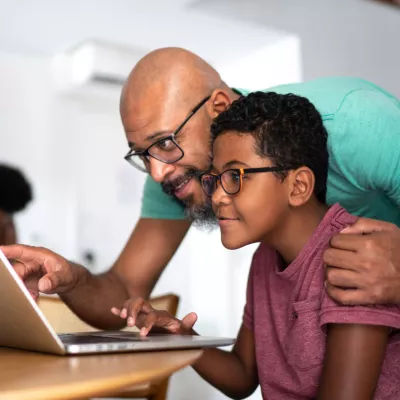- AdventHealth

Visiting theme parks goes along with summer fun, offering children and adults a chance to escape into a magical world of thrilling rides, favorite characters, funnel cakes and games. But this summer is a bit different as the focus has become keeping you and your family safe while enjoying a day at the park.
As theme parks reopen, here’s what you can expect and how you can stay protected.
Entering the Park
When you think of theme parks, you probably picture crowds and communal experiences. There are long lines for rides, fireworks and parades with people packed shoulder to shoulder to witness the spectacle. However, those shared experiences will be different, for now.
Instead, theme parks are instituting safety measures such as:
-
Advance reservations and limited attendance to allow for social distancing
-
Canceling of live events such as parades, fireworks or costumed performances
-
Contact-free purchases of tickets, food and souvenirs
-
Hand-sanitizing stations and signs with health and safety guidelines
-
Social distancing markings in lines and around the park
Planning Ahead to Protect Your Family
Beyond the safety steps that theme parks are taking, there are some ways you can protect your health. Plan ahead by following the guidelines from The Centers for Disease Control and Prevention (CDC). To stay healthy and protect others while having fun, here’s what you can do:
-
Avoid touching your eyes, nose and mouth with unwashed hands.
-
Be alert for symptoms such as fever, cough or shortness of breath.
-
Clean and disinfect frequently touched items such as your phone.
-
Cover coughs and sneezes with a tissue and wash your hands immediately.
-
Practice social distancing by avoiding close contact and staying at least 6 feet apart from employees and other guests at the park.
-
Stay home if you or anyone in your family doesn’t feel well.
-
Use a cloth face covering to cover your mouth and nose when around others, even if you do not feel sick.
-
Use restrooms or hand-sanitizing stations to wash your hands often with soap and water or sanitizer that is at least 60% alcohol.
Considering Your Health Risks
Your risk of contracting COVID-19 increases with a few factors, such as being in the CDC’s high-risk categories. These include:
-
Having obesity
-
Having a serious medical condition such as heart disease, diabetes, asthma, kidney disease, cancer, lung disease, HIV or AIDS or liver disease
-
Being older than age 65
-
Having a condition with a weakened immune system or taking medications like prednisone
In some cases, going to a theme park may not be advisable at this time if there is someone in your family who is at higher risk. In that case, selecting family activities that may have a reduced risk might be a better option. If you have any questions, speak to your physician for guidance.
Living in a state with a high infection rate and living with or being in contact with someone who was infected also increases your risk.
If you’re at higher risk, consider delaying your theme park visit to be safe for now.
Remember to Plan for the Heat, Too
With high temperatures at parks around the country, it’s critical you know how to identify indicators of heatstroke when you’re outdoors at a theme park.
Typically, heatstroke happens as a result of not consuming enough fluids and when your body temperature gets too hot. Protect your body from heatstroke by being mindful of the following symptoms:
-
A body temperature of 104° F or higher
-
Hallucinations
-
Headaches, confusion or trouble thinking clearly
-
Muscle cramps or weakness
-
Skin redness and warmth
-
Vomiting or diarrhea
If you experience these heatstroke warning signs, relocate to an area that will cool your body temperature down, drink fluids and seek medical advice immediately.
Stay Alert to Protect Yourself and Others
While the desire to return to some sort of normal is natural as the summer vacation season kicks off, know that you and your family play a vital role in staying healthy and keeping others healthy, too.
Taking precautions to keep cool and doing things like staying home if you feel sick, practicing social distancing, wearing a cloth face covering in public and practicing good hygiene — can make a difference to keep you safe as well as others around you.
We’re Here for You
We’re here to keep you and your family safe and healthy, whether you’re visiting on vacation or see us regularly for your whole-health care. Visit us at AdventHealth for Children or check out our locations to find those nearest you.



